Life Course Approaches to Health: Cultural and Societal Views
VerifiedAdded on 2023/01/16
|11
|3223
|35
Report
AI Summary
This report delves into life course approaches to health, focusing on how cultural perspectives shape the experiences of aging individuals. It examines varying practices related to elder care, respect, and end-of-life decisions across cultures like Japan, China, America, and Scotland, highlighting the influence of societal values and traditions. The analysis includes discussions on the challenges faced by aging societies, such as shifts in the economy, healthcare costs, and workforce dynamics. The report also explores the concept of voluntary death in certain cultures and the factors contributing to the longevity and well-being of the elderly in specific regions. Overall, the report provides a comprehensive overview of the diverse experiences and challenges related to aging in a global context.
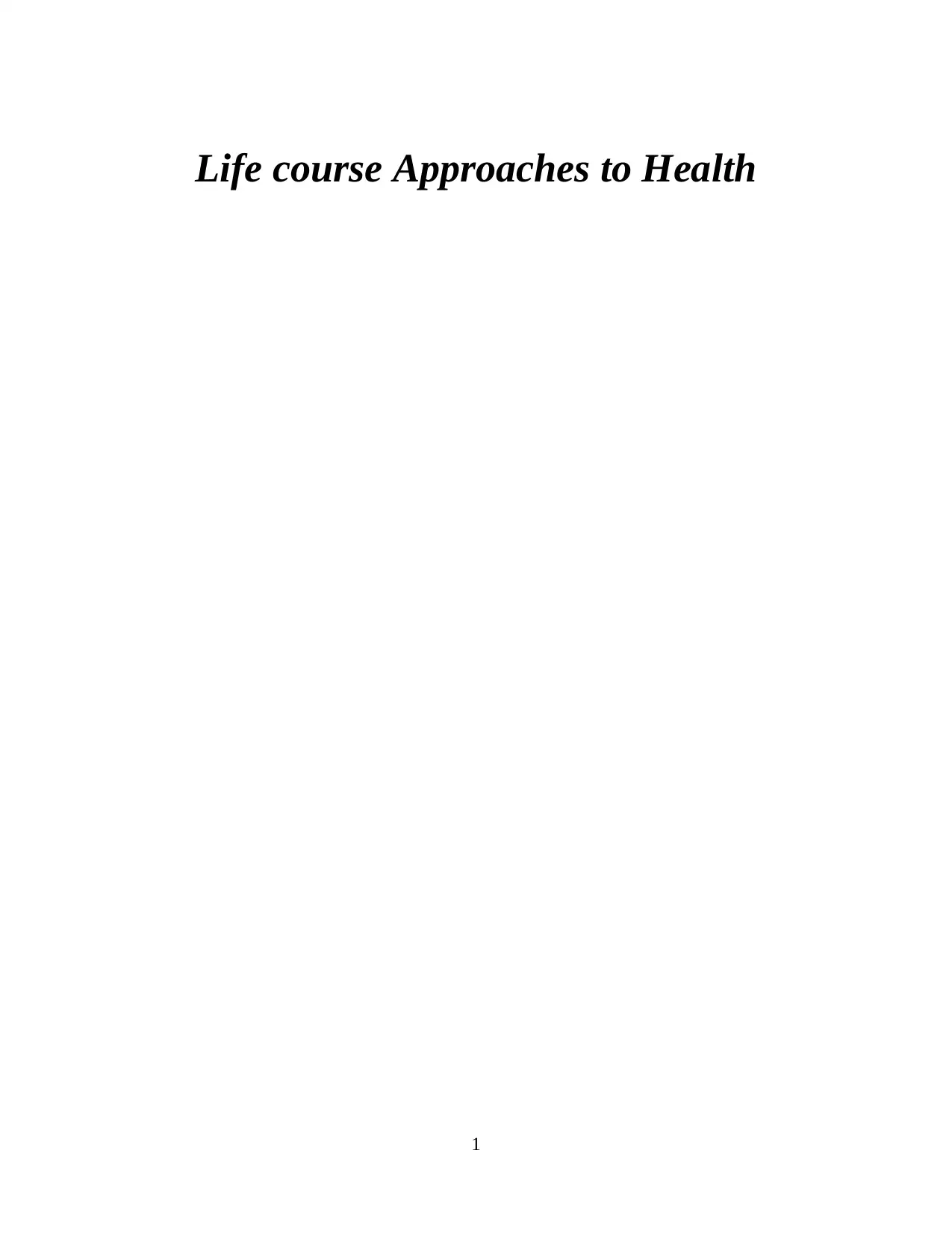
Life course Approaches to Health
1
1
Paraphrase This Document
Need a fresh take? Get an instant paraphrase of this document with our AI Paraphraser
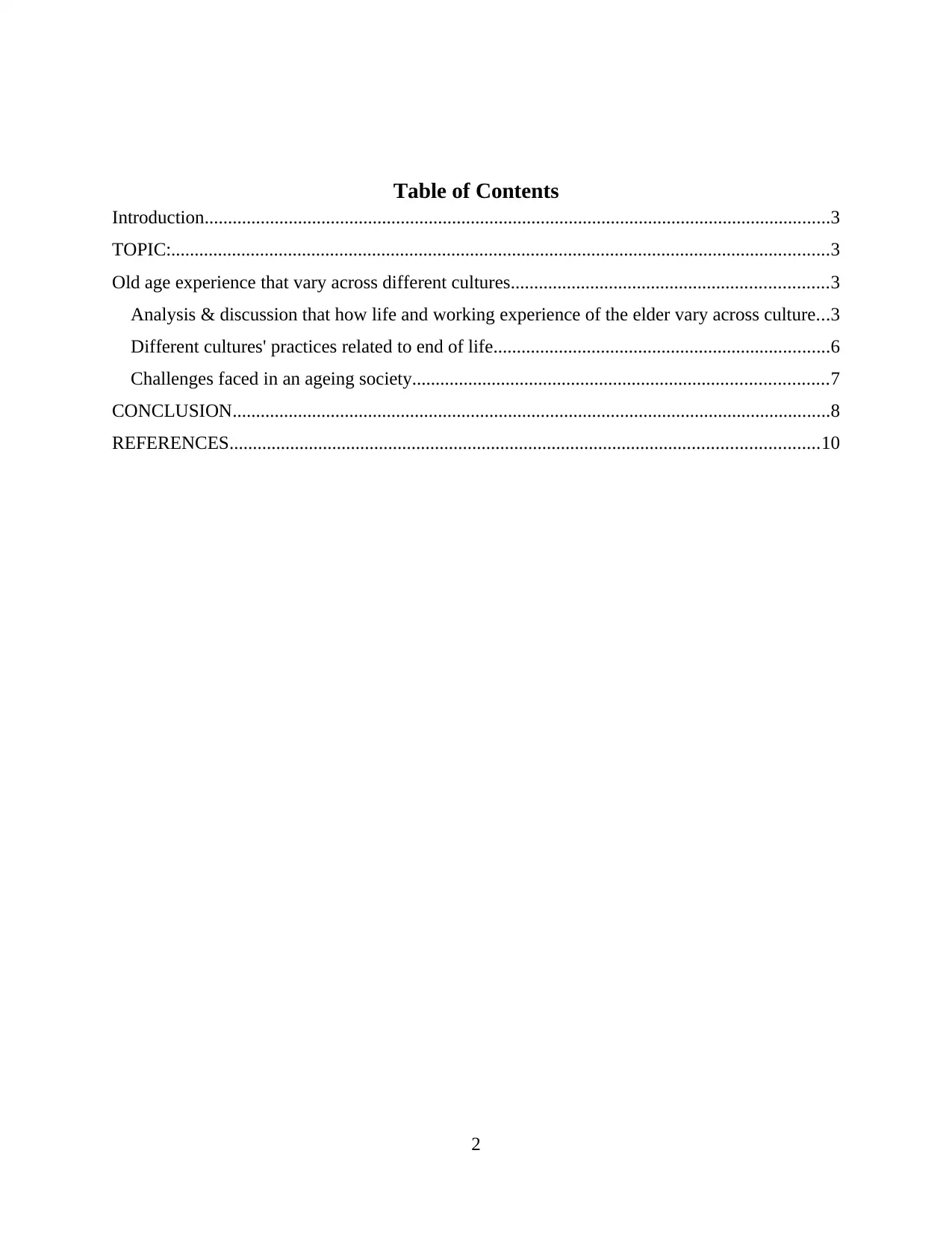
Table of Contents
Introduction......................................................................................................................................3
TOPIC:.............................................................................................................................................3
Old age experience that vary across different cultures....................................................................3
Analysis & discussion that how life and working experience of the elder vary across culture...3
Different cultures' practices related to end of life........................................................................6
Challenges faced in an ageing society.........................................................................................7
CONCLUSION................................................................................................................................8
REFERENCES..............................................................................................................................10
2
Introduction......................................................................................................................................3
TOPIC:.............................................................................................................................................3
Old age experience that vary across different cultures....................................................................3
Analysis & discussion that how life and working experience of the elder vary across culture...3
Different cultures' practices related to end of life........................................................................6
Challenges faced in an ageing society.........................................................................................7
CONCLUSION................................................................................................................................8
REFERENCES..............................................................................................................................10
2
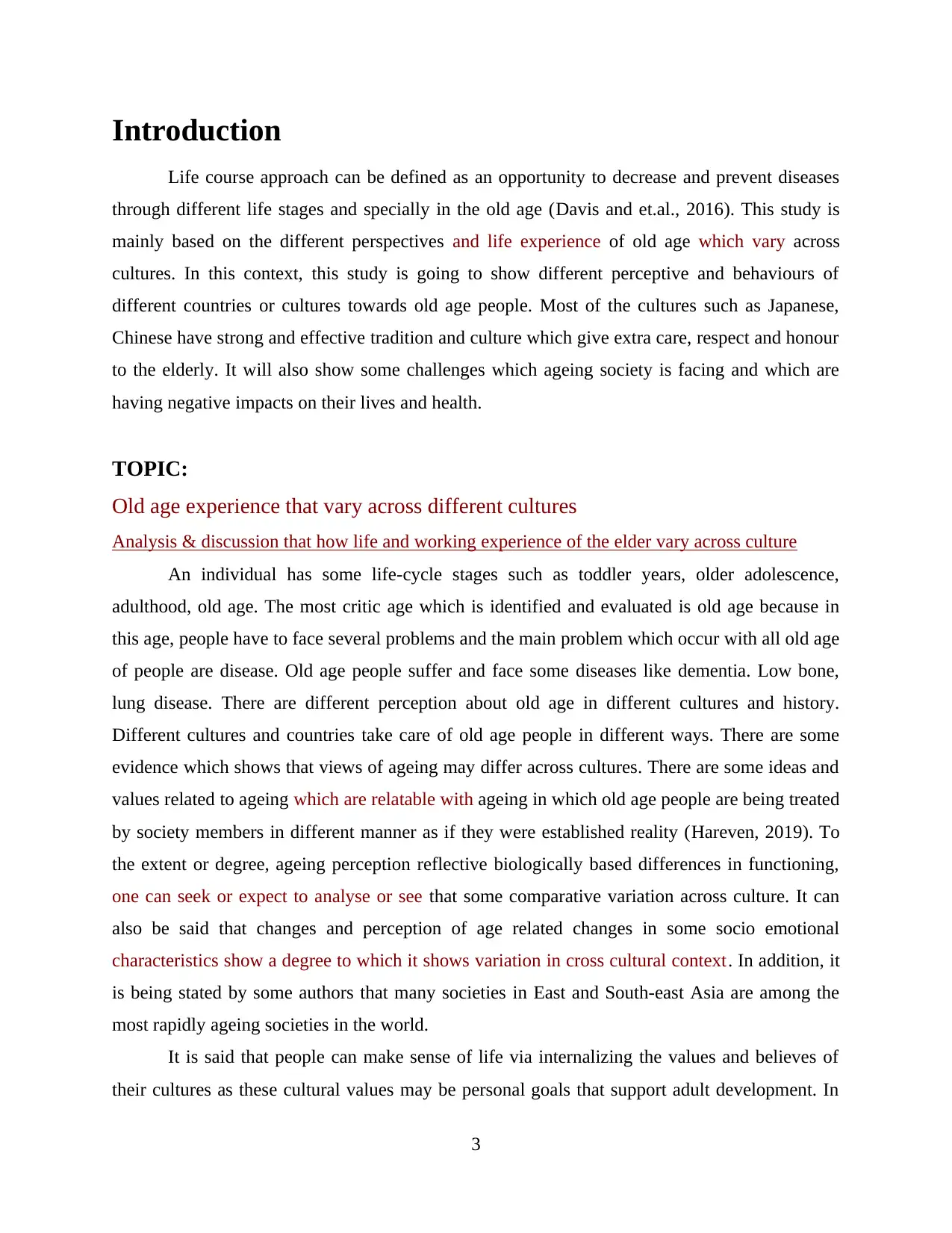
Introduction
Life course approach can be defined as an opportunity to decrease and prevent diseases
through different life stages and specially in the old age (Davis and et.al., 2016). This study is
mainly based on the different perspectives and life experience of old age which vary across
cultures. In this context, this study is going to show different perceptive and behaviours of
different countries or cultures towards old age people. Most of the cultures such as Japanese,
Chinese have strong and effective tradition and culture which give extra care, respect and honour
to the elderly. It will also show some challenges which ageing society is facing and which are
having negative impacts on their lives and health.
TOPIC:
Old age experience that vary across different cultures
Analysis & discussion that how life and working experience of the elder vary across culture
An individual has some life-cycle stages such as toddler years, older adolescence,
adulthood, old age. The most critic age which is identified and evaluated is old age because in
this age, people have to face several problems and the main problem which occur with all old age
of people are disease. Old age people suffer and face some diseases like dementia. Low bone,
lung disease. There are different perception about old age in different cultures and history.
Different cultures and countries take care of old age people in different ways. There are some
evidence which shows that views of ageing may differ across cultures. There are some ideas and
values related to ageing which are relatable with ageing in which old age people are being treated
by society members in different manner as if they were established reality (Hareven, 2019). To
the extent or degree, ageing perception reflective biologically based differences in functioning,
one can seek or expect to analyse or see that some comparative variation across culture. It can
also be said that changes and perception of age related changes in some socio emotional
characteristics show a degree to which it shows variation in cross cultural context. In addition, it
is being stated by some authors that many societies in East and South-east Asia are among the
most rapidly ageing societies in the world.
It is said that people can make sense of life via internalizing the values and believes of
their cultures as these cultural values may be personal goals that support adult development. In
3
Life course approach can be defined as an opportunity to decrease and prevent diseases
through different life stages and specially in the old age (Davis and et.al., 2016). This study is
mainly based on the different perspectives and life experience of old age which vary across
cultures. In this context, this study is going to show different perceptive and behaviours of
different countries or cultures towards old age people. Most of the cultures such as Japanese,
Chinese have strong and effective tradition and culture which give extra care, respect and honour
to the elderly. It will also show some challenges which ageing society is facing and which are
having negative impacts on their lives and health.
TOPIC:
Old age experience that vary across different cultures
Analysis & discussion that how life and working experience of the elder vary across culture
An individual has some life-cycle stages such as toddler years, older adolescence,
adulthood, old age. The most critic age which is identified and evaluated is old age because in
this age, people have to face several problems and the main problem which occur with all old age
of people are disease. Old age people suffer and face some diseases like dementia. Low bone,
lung disease. There are different perception about old age in different cultures and history.
Different cultures and countries take care of old age people in different ways. There are some
evidence which shows that views of ageing may differ across cultures. There are some ideas and
values related to ageing which are relatable with ageing in which old age people are being treated
by society members in different manner as if they were established reality (Hareven, 2019). To
the extent or degree, ageing perception reflective biologically based differences in functioning,
one can seek or expect to analyse or see that some comparative variation across culture. It can
also be said that changes and perception of age related changes in some socio emotional
characteristics show a degree to which it shows variation in cross cultural context. In addition, it
is being stated by some authors that many societies in East and South-east Asia are among the
most rapidly ageing societies in the world.
It is said that people can make sense of life via internalizing the values and believes of
their cultures as these cultural values may be personal goals that support adult development. In
3
⊘ This is a preview!⊘
Do you want full access?
Subscribe today to unlock all pages.

Trusted by 1+ million students worldwide
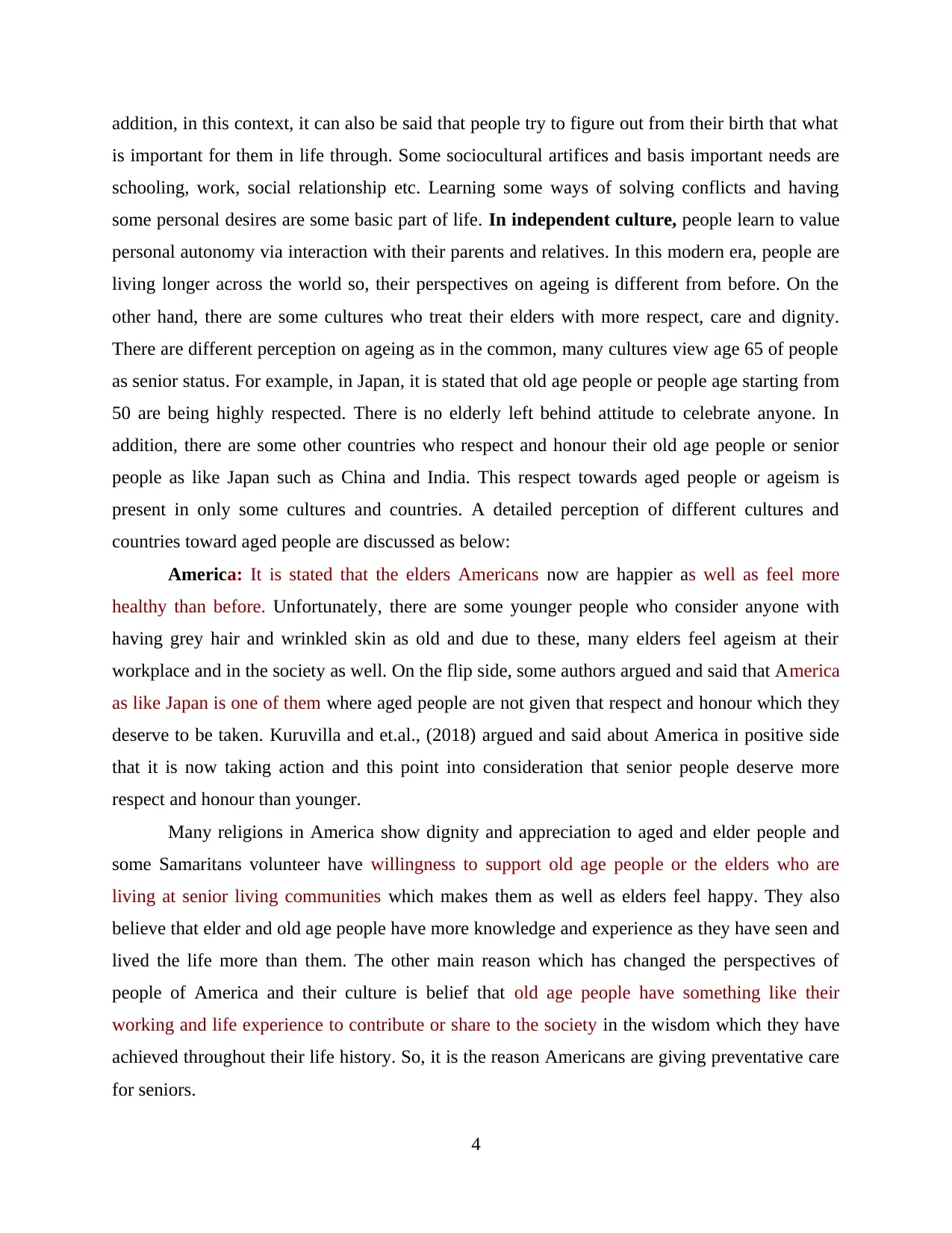
addition, in this context, it can also be said that people try to figure out from their birth that what
is important for them in life through. Some sociocultural artifices and basis important needs are
schooling, work, social relationship etc. Learning some ways of solving conflicts and having
some personal desires are some basic part of life. In independent culture, people learn to value
personal autonomy via interaction with their parents and relatives. In this modern era, people are
living longer across the world so, their perspectives on ageing is different from before. On the
other hand, there are some cultures who treat their elders with more respect, care and dignity.
There are different perception on ageing as in the common, many cultures view age 65 of people
as senior status. For example, in Japan, it is stated that old age people or people age starting from
50 are being highly respected. There is no elderly left behind attitude to celebrate anyone. In
addition, there are some other countries who respect and honour their old age people or senior
people as like Japan such as China and India. This respect towards aged people or ageism is
present in only some cultures and countries. A detailed perception of different cultures and
countries toward aged people are discussed as below:
America: It is stated that the elders Americans now are happier as well as feel more
healthy than before. Unfortunately, there are some younger people who consider anyone with
having grey hair and wrinkled skin as old and due to these, many elders feel ageism at their
workplace and in the society as well. On the flip side, some authors argued and said that America
as like Japan is one of them where aged people are not given that respect and honour which they
deserve to be taken. Kuruvilla and et.al., (2018) argued and said about America in positive side
that it is now taking action and this point into consideration that senior people deserve more
respect and honour than younger.
Many religions in America show dignity and appreciation to aged and elder people and
some Samaritans volunteer have willingness to support old age people or the elders who are
living at senior living communities which makes them as well as elders feel happy. They also
believe that elder and old age people have more knowledge and experience as they have seen and
lived the life more than them. The other main reason which has changed the perspectives of
people of America and their culture is belief that old age people have something like their
working and life experience to contribute or share to the society in the wisdom which they have
achieved throughout their life history. So, it is the reason Americans are giving preventative care
for seniors.
4
is important for them in life through. Some sociocultural artifices and basis important needs are
schooling, work, social relationship etc. Learning some ways of solving conflicts and having
some personal desires are some basic part of life. In independent culture, people learn to value
personal autonomy via interaction with their parents and relatives. In this modern era, people are
living longer across the world so, their perspectives on ageing is different from before. On the
other hand, there are some cultures who treat their elders with more respect, care and dignity.
There are different perception on ageing as in the common, many cultures view age 65 of people
as senior status. For example, in Japan, it is stated that old age people or people age starting from
50 are being highly respected. There is no elderly left behind attitude to celebrate anyone. In
addition, there are some other countries who respect and honour their old age people or senior
people as like Japan such as China and India. This respect towards aged people or ageism is
present in only some cultures and countries. A detailed perception of different cultures and
countries toward aged people are discussed as below:
America: It is stated that the elders Americans now are happier as well as feel more
healthy than before. Unfortunately, there are some younger people who consider anyone with
having grey hair and wrinkled skin as old and due to these, many elders feel ageism at their
workplace and in the society as well. On the flip side, some authors argued and said that America
as like Japan is one of them where aged people are not given that respect and honour which they
deserve to be taken. Kuruvilla and et.al., (2018) argued and said about America in positive side
that it is now taking action and this point into consideration that senior people deserve more
respect and honour than younger.
Many religions in America show dignity and appreciation to aged and elder people and
some Samaritans volunteer have willingness to support old age people or the elders who are
living at senior living communities which makes them as well as elders feel happy. They also
believe that elder and old age people have more knowledge and experience as they have seen and
lived the life more than them. The other main reason which has changed the perspectives of
people of America and their culture is belief that old age people have something like their
working and life experience to contribute or share to the society in the wisdom which they have
achieved throughout their life history. So, it is the reason Americans are giving preventative care
for seniors.
4
Paraphrase This Document
Need a fresh take? Get an instant paraphrase of this document with our AI Paraphraser
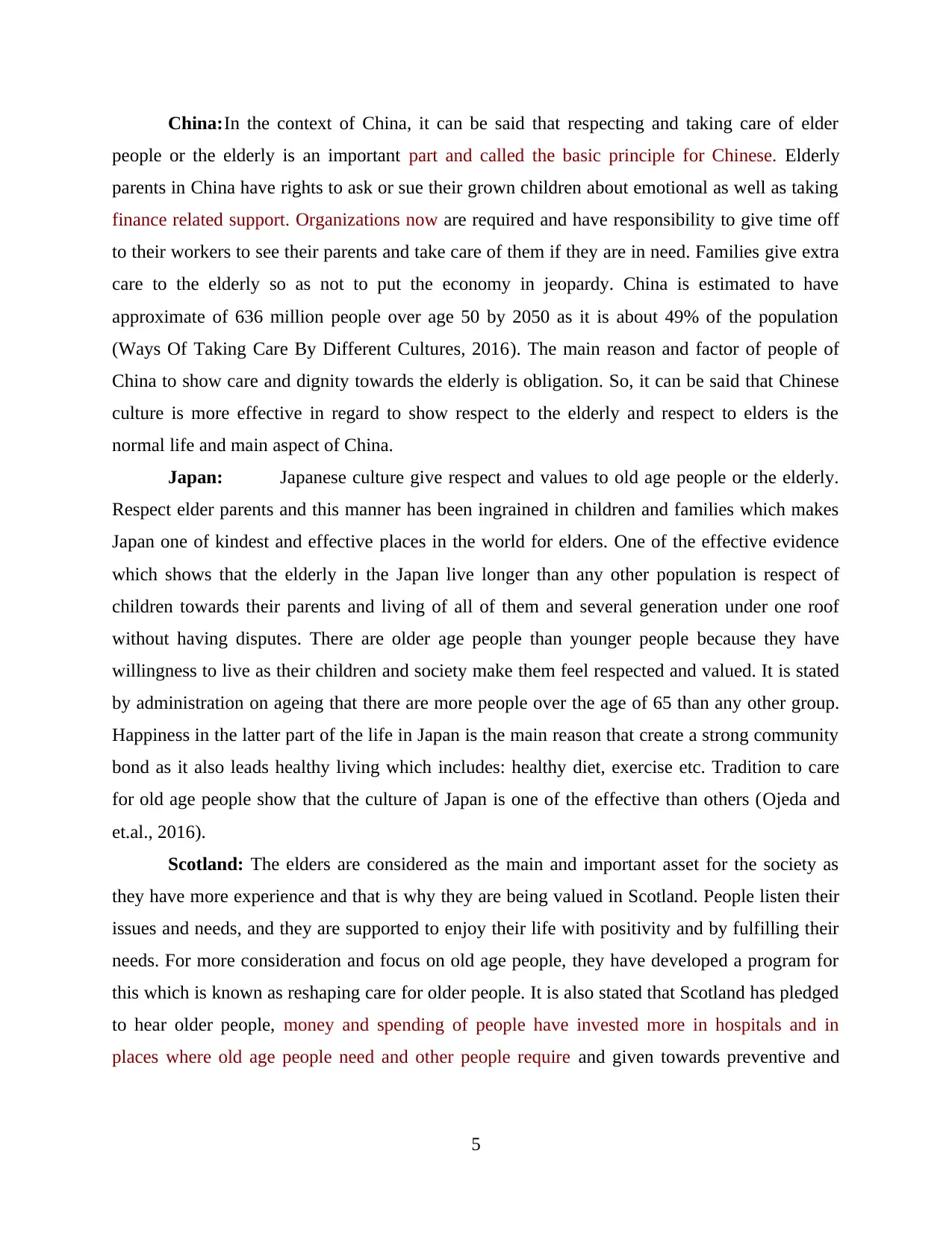
China:In the context of China, it can be said that respecting and taking care of elder
people or the elderly is an important part and called the basic principle for Chinese. Elderly
parents in China have rights to ask or sue their grown children about emotional as well as taking
finance related support. Organizations now are required and have responsibility to give time off
to their workers to see their parents and take care of them if they are in need. Families give extra
care to the elderly so as not to put the economy in jeopardy. China is estimated to have
approximate of 636 million people over age 50 by 2050 as it is about 49% of the population
(Ways Of Taking Care By Different Cultures, 2016). The main reason and factor of people of
China to show care and dignity towards the elderly is obligation. So, it can be said that Chinese
culture is more effective in regard to show respect to the elderly and respect to elders is the
normal life and main aspect of China.
Japan: Japanese culture give respect and values to old age people or the elderly.
Respect elder parents and this manner has been ingrained in children and families which makes
Japan one of kindest and effective places in the world for elders. One of the effective evidence
which shows that the elderly in the Japan live longer than any other population is respect of
children towards their parents and living of all of them and several generation under one roof
without having disputes. There are older age people than younger people because they have
willingness to live as their children and society make them feel respected and valued. It is stated
by administration on ageing that there are more people over the age of 65 than any other group.
Happiness in the latter part of the life in Japan is the main reason that create a strong community
bond as it also leads healthy living which includes: healthy diet, exercise etc. Tradition to care
for old age people show that the culture of Japan is one of the effective than others (Ojeda and
et.al., 2016).
Scotland: The elders are considered as the main and important asset for the society as
they have more experience and that is why they are being valued in Scotland. People listen their
issues and needs, and they are supported to enjoy their life with positivity and by fulfilling their
needs. For more consideration and focus on old age people, they have developed a program for
this which is known as reshaping care for older people. It is also stated that Scotland has pledged
to hear older people, money and spending of people have invested more in hospitals and in
places where old age people need and other people require and given towards preventive and
5
people or the elderly is an important part and called the basic principle for Chinese. Elderly
parents in China have rights to ask or sue their grown children about emotional as well as taking
finance related support. Organizations now are required and have responsibility to give time off
to their workers to see their parents and take care of them if they are in need. Families give extra
care to the elderly so as not to put the economy in jeopardy. China is estimated to have
approximate of 636 million people over age 50 by 2050 as it is about 49% of the population
(Ways Of Taking Care By Different Cultures, 2016). The main reason and factor of people of
China to show care and dignity towards the elderly is obligation. So, it can be said that Chinese
culture is more effective in regard to show respect to the elderly and respect to elders is the
normal life and main aspect of China.
Japan: Japanese culture give respect and values to old age people or the elderly.
Respect elder parents and this manner has been ingrained in children and families which makes
Japan one of kindest and effective places in the world for elders. One of the effective evidence
which shows that the elderly in the Japan live longer than any other population is respect of
children towards their parents and living of all of them and several generation under one roof
without having disputes. There are older age people than younger people because they have
willingness to live as their children and society make them feel respected and valued. It is stated
by administration on ageing that there are more people over the age of 65 than any other group.
Happiness in the latter part of the life in Japan is the main reason that create a strong community
bond as it also leads healthy living which includes: healthy diet, exercise etc. Tradition to care
for old age people show that the culture of Japan is one of the effective than others (Ojeda and
et.al., 2016).
Scotland: The elders are considered as the main and important asset for the society as
they have more experience and that is why they are being valued in Scotland. People listen their
issues and needs, and they are supported to enjoy their life with positivity and by fulfilling their
needs. For more consideration and focus on old age people, they have developed a program for
this which is known as reshaping care for older people. It is also stated that Scotland has pledged
to hear older people, money and spending of people have invested more in hospitals and in
places where old age people need and other people require and given towards preventive and
5
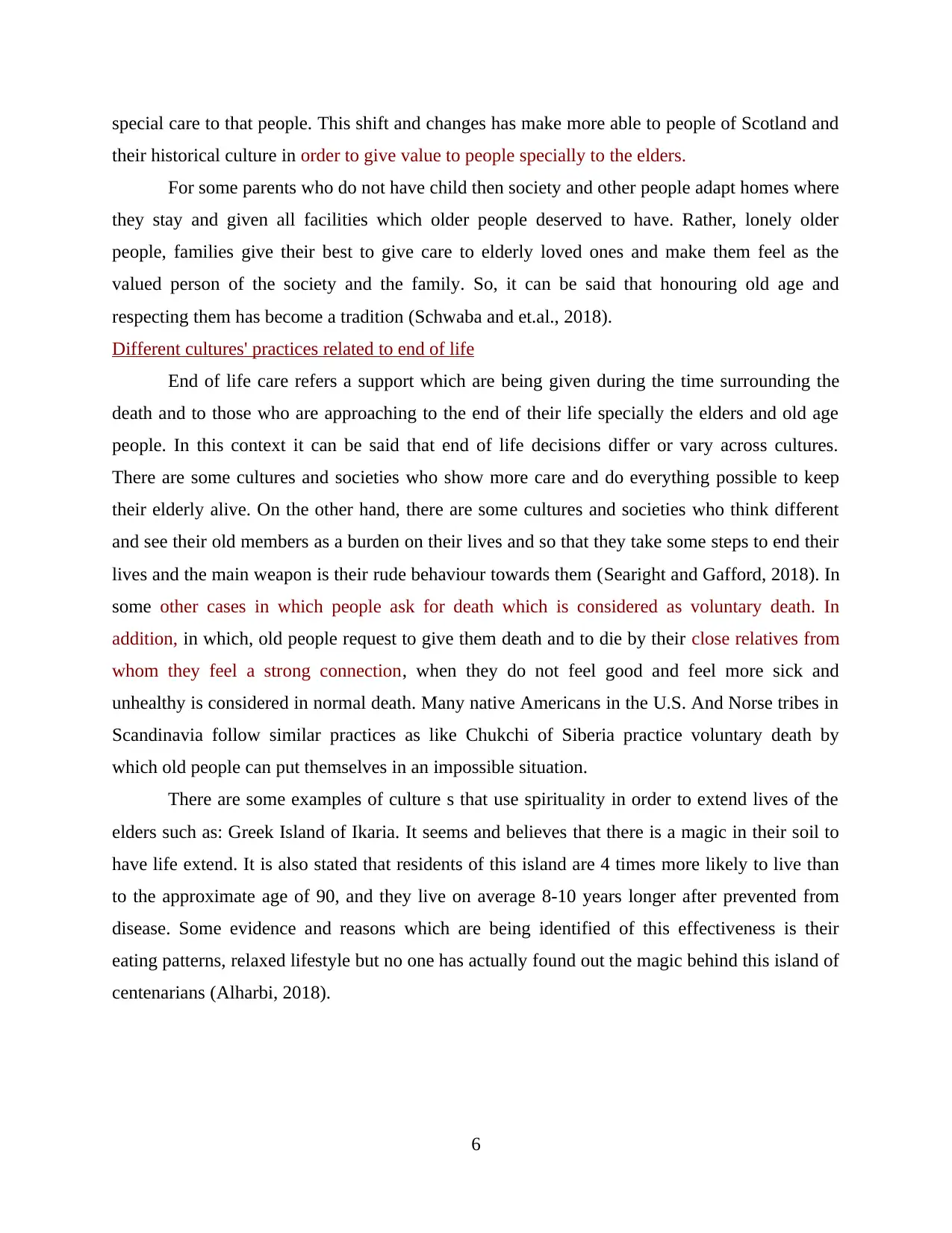
special care to that people. This shift and changes has make more able to people of Scotland and
their historical culture in order to give value to people specially to the elders.
For some parents who do not have child then society and other people adapt homes where
they stay and given all facilities which older people deserved to have. Rather, lonely older
people, families give their best to give care to elderly loved ones and make them feel as the
valued person of the society and the family. So, it can be said that honouring old age and
respecting them has become a tradition (Schwaba and et.al., 2018).
Different cultures' practices related to end of life
End of life care refers a support which are being given during the time surrounding the
death and to those who are approaching to the end of their life specially the elders and old age
people. In this context it can be said that end of life decisions differ or vary across cultures.
There are some cultures and societies who show more care and do everything possible to keep
their elderly alive. On the other hand, there are some cultures and societies who think different
and see their old members as a burden on their lives and so that they take some steps to end their
lives and the main weapon is their rude behaviour towards them (Searight and Gafford, 2018). In
some other cases in which people ask for death which is considered as voluntary death. In
addition, in which, old people request to give them death and to die by their close relatives from
whom they feel a strong connection, when they do not feel good and feel more sick and
unhealthy is considered in normal death. Many native Americans in the U.S. And Norse tribes in
Scandinavia follow similar practices as like Chukchi of Siberia practice voluntary death by
which old people can put themselves in an impossible situation.
There are some examples of culture s that use spirituality in order to extend lives of the
elders such as: Greek Island of Ikaria. It seems and believes that there is a magic in their soil to
have life extend. It is also stated that residents of this island are 4 times more likely to live than
to the approximate age of 90, and they live on average 8-10 years longer after prevented from
disease. Some evidence and reasons which are being identified of this effectiveness is their
eating patterns, relaxed lifestyle but no one has actually found out the magic behind this island of
centenarians (Alharbi, 2018).
6
their historical culture in order to give value to people specially to the elders.
For some parents who do not have child then society and other people adapt homes where
they stay and given all facilities which older people deserved to have. Rather, lonely older
people, families give their best to give care to elderly loved ones and make them feel as the
valued person of the society and the family. So, it can be said that honouring old age and
respecting them has become a tradition (Schwaba and et.al., 2018).
Different cultures' practices related to end of life
End of life care refers a support which are being given during the time surrounding the
death and to those who are approaching to the end of their life specially the elders and old age
people. In this context it can be said that end of life decisions differ or vary across cultures.
There are some cultures and societies who show more care and do everything possible to keep
their elderly alive. On the other hand, there are some cultures and societies who think different
and see their old members as a burden on their lives and so that they take some steps to end their
lives and the main weapon is their rude behaviour towards them (Searight and Gafford, 2018). In
some other cases in which people ask for death which is considered as voluntary death. In
addition, in which, old people request to give them death and to die by their close relatives from
whom they feel a strong connection, when they do not feel good and feel more sick and
unhealthy is considered in normal death. Many native Americans in the U.S. And Norse tribes in
Scandinavia follow similar practices as like Chukchi of Siberia practice voluntary death by
which old people can put themselves in an impossible situation.
There are some examples of culture s that use spirituality in order to extend lives of the
elders such as: Greek Island of Ikaria. It seems and believes that there is a magic in their soil to
have life extend. It is also stated that residents of this island are 4 times more likely to live than
to the approximate age of 90, and they live on average 8-10 years longer after prevented from
disease. Some evidence and reasons which are being identified of this effectiveness is their
eating patterns, relaxed lifestyle but no one has actually found out the magic behind this island of
centenarians (Alharbi, 2018).
6
⊘ This is a preview!⊘
Do you want full access?
Subscribe today to unlock all pages.

Trusted by 1+ million students worldwide
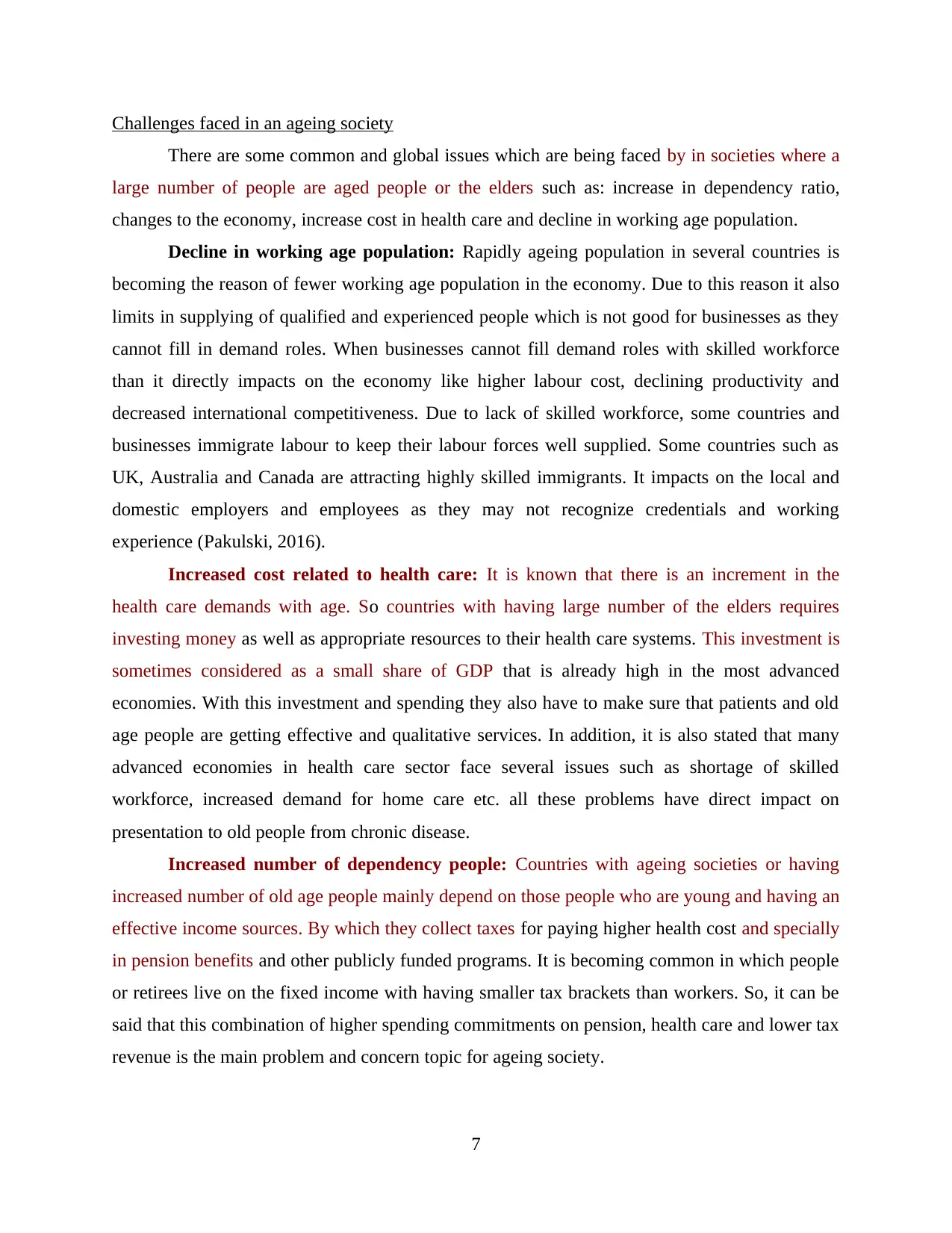
Challenges faced in an ageing society
There are some common and global issues which are being faced by in societies where a
large number of people are aged people or the elders such as: increase in dependency ratio,
changes to the economy, increase cost in health care and decline in working age population.
Decline in working age population: Rapidly ageing population in several countries is
becoming the reason of fewer working age population in the economy. Due to this reason it also
limits in supplying of qualified and experienced people which is not good for businesses as they
cannot fill in demand roles. When businesses cannot fill demand roles with skilled workforce
than it directly impacts on the economy like higher labour cost, declining productivity and
decreased international competitiveness. Due to lack of skilled workforce, some countries and
businesses immigrate labour to keep their labour forces well supplied. Some countries such as
UK, Australia and Canada are attracting highly skilled immigrants. It impacts on the local and
domestic employers and employees as they may not recognize credentials and working
experience (Pakulski, 2016).
Increased cost related to health care: It is known that there is an increment in the
health care demands with age. So countries with having large number of the elders requires
investing money as well as appropriate resources to their health care systems. This investment is
sometimes considered as a small share of GDP that is already high in the most advanced
economies. With this investment and spending they also have to make sure that patients and old
age people are getting effective and qualitative services. In addition, it is also stated that many
advanced economies in health care sector face several issues such as shortage of skilled
workforce, increased demand for home care etc. all these problems have direct impact on
presentation to old people from chronic disease.
Increased number of dependency people: Countries with ageing societies or having
increased number of old age people mainly depend on those people who are young and having an
effective income sources. By which they collect taxes for paying higher health cost and specially
in pension benefits and other publicly funded programs. It is becoming common in which people
or retirees live on the fixed income with having smaller tax brackets than workers. So, it can be
said that this combination of higher spending commitments on pension, health care and lower tax
revenue is the main problem and concern topic for ageing society.
7
There are some common and global issues which are being faced by in societies where a
large number of people are aged people or the elders such as: increase in dependency ratio,
changes to the economy, increase cost in health care and decline in working age population.
Decline in working age population: Rapidly ageing population in several countries is
becoming the reason of fewer working age population in the economy. Due to this reason it also
limits in supplying of qualified and experienced people which is not good for businesses as they
cannot fill in demand roles. When businesses cannot fill demand roles with skilled workforce
than it directly impacts on the economy like higher labour cost, declining productivity and
decreased international competitiveness. Due to lack of skilled workforce, some countries and
businesses immigrate labour to keep their labour forces well supplied. Some countries such as
UK, Australia and Canada are attracting highly skilled immigrants. It impacts on the local and
domestic employers and employees as they may not recognize credentials and working
experience (Pakulski, 2016).
Increased cost related to health care: It is known that there is an increment in the
health care demands with age. So countries with having large number of the elders requires
investing money as well as appropriate resources to their health care systems. This investment is
sometimes considered as a small share of GDP that is already high in the most advanced
economies. With this investment and spending they also have to make sure that patients and old
age people are getting effective and qualitative services. In addition, it is also stated that many
advanced economies in health care sector face several issues such as shortage of skilled
workforce, increased demand for home care etc. all these problems have direct impact on
presentation to old people from chronic disease.
Increased number of dependency people: Countries with ageing societies or having
increased number of old age people mainly depend on those people who are young and having an
effective income sources. By which they collect taxes for paying higher health cost and specially
in pension benefits and other publicly funded programs. It is becoming common in which people
or retirees live on the fixed income with having smaller tax brackets than workers. So, it can be
said that this combination of higher spending commitments on pension, health care and lower tax
revenue is the main problem and concern topic for ageing society.
7
Paraphrase This Document
Need a fresh take? Get an instant paraphrase of this document with our AI Paraphraser
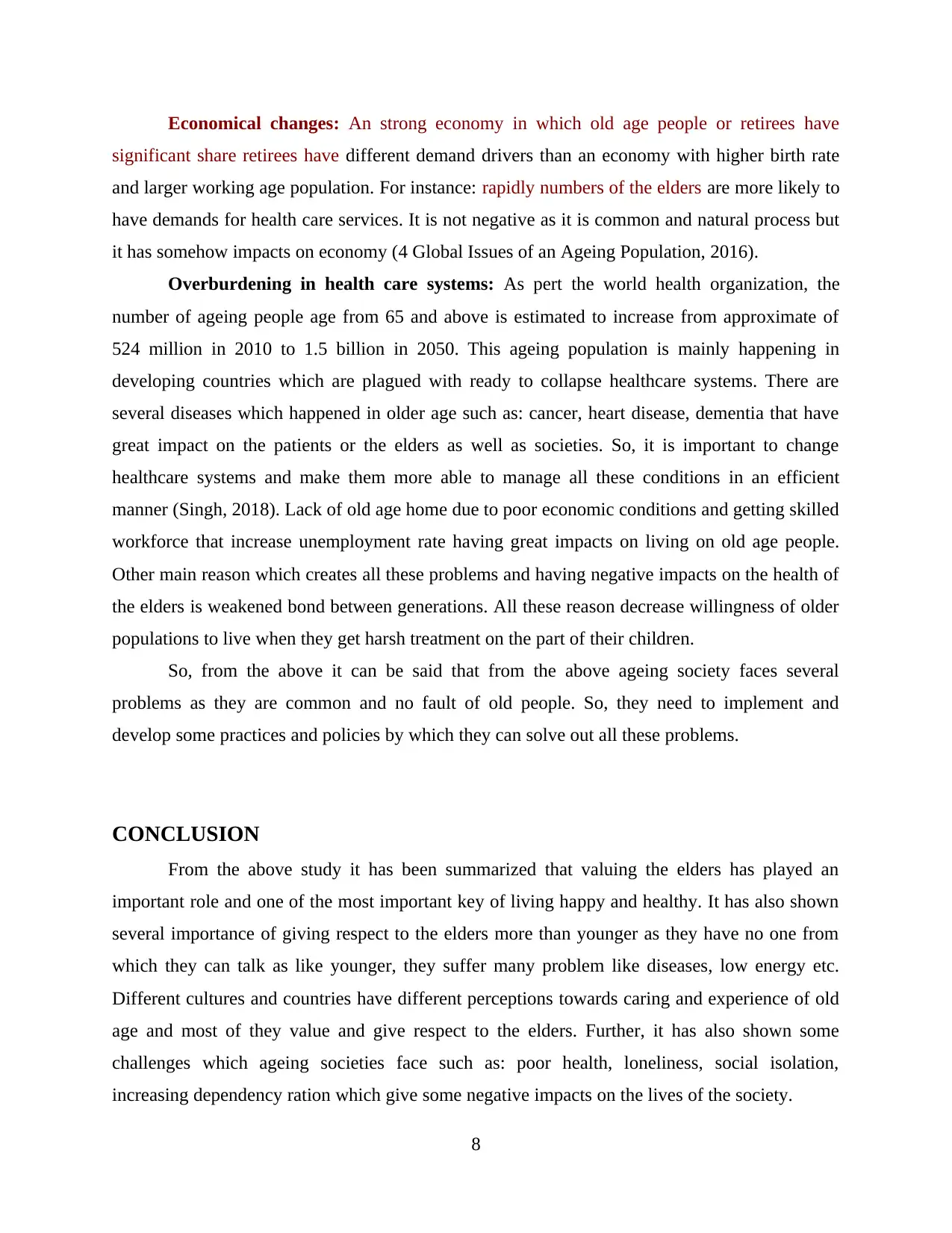
Economical changes: An strong economy in which old age people or retirees have
significant share retirees have different demand drivers than an economy with higher birth rate
and larger working age population. For instance: rapidly numbers of the elders are more likely to
have demands for health care services. It is not negative as it is common and natural process but
it has somehow impacts on economy (4 Global Issues of an Ageing Population, 2016).
Overburdening in health care systems: As pert the world health organization, the
number of ageing people age from 65 and above is estimated to increase from approximate of
524 million in 2010 to 1.5 billion in 2050. This ageing population is mainly happening in
developing countries which are plagued with ready to collapse healthcare systems. There are
several diseases which happened in older age such as: cancer, heart disease, dementia that have
great impact on the patients or the elders as well as societies. So, it is important to change
healthcare systems and make them more able to manage all these conditions in an efficient
manner (Singh, 2018). Lack of old age home due to poor economic conditions and getting skilled
workforce that increase unemployment rate having great impacts on living on old age people.
Other main reason which creates all these problems and having negative impacts on the health of
the elders is weakened bond between generations. All these reason decrease willingness of older
populations to live when they get harsh treatment on the part of their children.
So, from the above it can be said that from the above ageing society faces several
problems as they are common and no fault of old people. So, they need to implement and
develop some practices and policies by which they can solve out all these problems.
CONCLUSION
From the above study it has been summarized that valuing the elders has played an
important role and one of the most important key of living happy and healthy. It has also shown
several importance of giving respect to the elders more than younger as they have no one from
which they can talk as like younger, they suffer many problem like diseases, low energy etc.
Different cultures and countries have different perceptions towards caring and experience of old
age and most of they value and give respect to the elders. Further, it has also shown some
challenges which ageing societies face such as: poor health, loneliness, social isolation,
increasing dependency ration which give some negative impacts on the lives of the society.
8
significant share retirees have different demand drivers than an economy with higher birth rate
and larger working age population. For instance: rapidly numbers of the elders are more likely to
have demands for health care services. It is not negative as it is common and natural process but
it has somehow impacts on economy (4 Global Issues of an Ageing Population, 2016).
Overburdening in health care systems: As pert the world health organization, the
number of ageing people age from 65 and above is estimated to increase from approximate of
524 million in 2010 to 1.5 billion in 2050. This ageing population is mainly happening in
developing countries which are plagued with ready to collapse healthcare systems. There are
several diseases which happened in older age such as: cancer, heart disease, dementia that have
great impact on the patients or the elders as well as societies. So, it is important to change
healthcare systems and make them more able to manage all these conditions in an efficient
manner (Singh, 2018). Lack of old age home due to poor economic conditions and getting skilled
workforce that increase unemployment rate having great impacts on living on old age people.
Other main reason which creates all these problems and having negative impacts on the health of
the elders is weakened bond between generations. All these reason decrease willingness of older
populations to live when they get harsh treatment on the part of their children.
So, from the above it can be said that from the above ageing society faces several
problems as they are common and no fault of old people. So, they need to implement and
develop some practices and policies by which they can solve out all these problems.
CONCLUSION
From the above study it has been summarized that valuing the elders has played an
important role and one of the most important key of living happy and healthy. It has also shown
several importance of giving respect to the elders more than younger as they have no one from
which they can talk as like younger, they suffer many problem like diseases, low energy etc.
Different cultures and countries have different perceptions towards caring and experience of old
age and most of they value and give respect to the elders. Further, it has also shown some
challenges which ageing societies face such as: poor health, loneliness, social isolation,
increasing dependency ration which give some negative impacts on the lives of the society.
8

9
⊘ This is a preview!⊘
Do you want full access?
Subscribe today to unlock all pages.

Trusted by 1+ million students worldwide
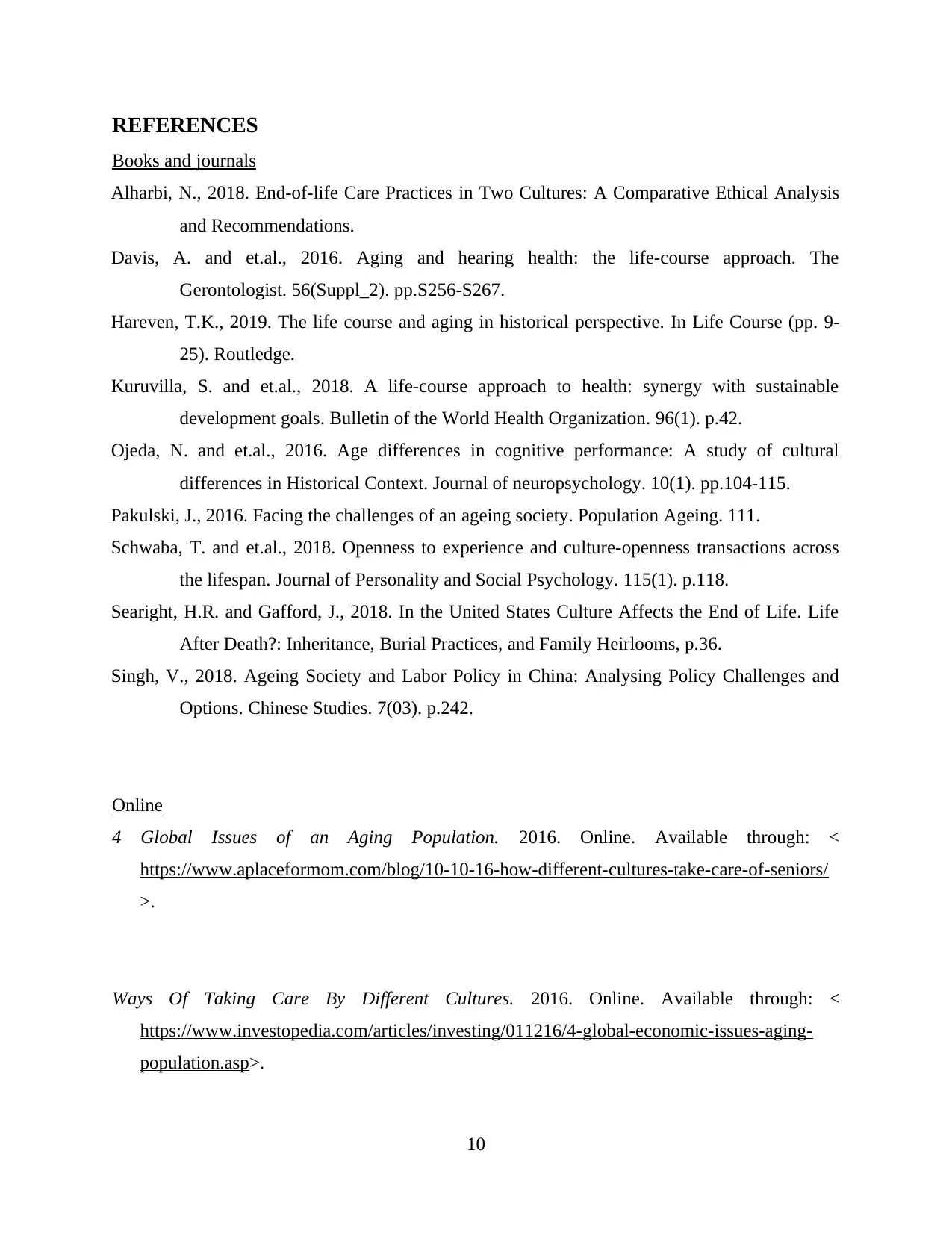
REFERENCES
Books and journals
Alharbi, N., 2018. End-of-life Care Practices in Two Cultures: A Comparative Ethical Analysis
and Recommendations.
Davis, A. and et.al., 2016. Aging and hearing health: the life-course approach. The
Gerontologist. 56(Suppl_2). pp.S256-S267.
Hareven, T.Κ., 2019. The life course and aging in historical perspective. In Life Course (pp. 9-
25). Routledge.
Kuruvilla, S. and et.al., 2018. A life-course approach to health: synergy with sustainable
development goals. Bulletin of the World Health Organization. 96(1). p.42.
Ojeda, N. and et.al., 2016. Age differences in cognitive performance: A study of cultural
differences in Historical Context. Journal of neuropsychology. 10(1). pp.104-115.
Pakulski, J., 2016. Facing the challenges of an ageing society. Population Ageing. 111.
Schwaba, T. and et.al., 2018. Openness to experience and culture-openness transactions across
the lifespan. Journal of Personality and Social Psychology. 115(1). p.118.
Searight, H.R. and Gafford, J., 2018. In the United States Culture Affects the End of Life. Life
After Death?: Inheritance, Burial Practices, and Family Heirlooms, p.36.
Singh, V., 2018. Ageing Society and Labor Policy in China: Analysing Policy Challenges and
Options. Chinese Studies. 7(03). p.242.
Online
4 Global Issues of an Aging Population. 2016. Online. Available through: <
https://www.aplaceformom.com/blog/10-10-16-how-different-cultures-take-care-of-seniors/
>.
Ways Of Taking Care By Different Cultures. 2016. Online. Available through: <
https://www.investopedia.com/articles/investing/011216/4-global-economic-issues-aging-
population.asp>.
10
Books and journals
Alharbi, N., 2018. End-of-life Care Practices in Two Cultures: A Comparative Ethical Analysis
and Recommendations.
Davis, A. and et.al., 2016. Aging and hearing health: the life-course approach. The
Gerontologist. 56(Suppl_2). pp.S256-S267.
Hareven, T.Κ., 2019. The life course and aging in historical perspective. In Life Course (pp. 9-
25). Routledge.
Kuruvilla, S. and et.al., 2018. A life-course approach to health: synergy with sustainable
development goals. Bulletin of the World Health Organization. 96(1). p.42.
Ojeda, N. and et.al., 2016. Age differences in cognitive performance: A study of cultural
differences in Historical Context. Journal of neuropsychology. 10(1). pp.104-115.
Pakulski, J., 2016. Facing the challenges of an ageing society. Population Ageing. 111.
Schwaba, T. and et.al., 2018. Openness to experience and culture-openness transactions across
the lifespan. Journal of Personality and Social Psychology. 115(1). p.118.
Searight, H.R. and Gafford, J., 2018. In the United States Culture Affects the End of Life. Life
After Death?: Inheritance, Burial Practices, and Family Heirlooms, p.36.
Singh, V., 2018. Ageing Society and Labor Policy in China: Analysing Policy Challenges and
Options. Chinese Studies. 7(03). p.242.
Online
4 Global Issues of an Aging Population. 2016. Online. Available through: <
https://www.aplaceformom.com/blog/10-10-16-how-different-cultures-take-care-of-seniors/
>.
Ways Of Taking Care By Different Cultures. 2016. Online. Available through: <
https://www.investopedia.com/articles/investing/011216/4-global-economic-issues-aging-
population.asp>.
10
Paraphrase This Document
Need a fresh take? Get an instant paraphrase of this document with our AI Paraphraser

11
1 out of 11
Related Documents
Your All-in-One AI-Powered Toolkit for Academic Success.
+13062052269
info@desklib.com
Available 24*7 on WhatsApp / Email
![[object Object]](/_next/static/media/star-bottom.7253800d.svg)
Unlock your academic potential
Copyright © 2020–2025 A2Z Services. All Rights Reserved. Developed and managed by ZUCOL.





